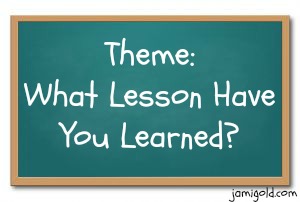Several interesting conversations grew out of my post on themes and how they relate to our worldview. So many of us have struggled with themes on some level that I wanted to share more about how we can develop them through our characters.
Last time we discussed how it’s difficult for us to write stories with themes opposite our core beliefs. We’re more likely to create stories where the point—the theme—is in line with our worldview.
On the other hand, our characters often hold opposite beliefs. That’s not surprising when it comes to our villains. After all, we call them the “bad guy” for a reason.
However, our protagonists might have beliefs opposite to ours as well. At least at the start. And their story journey is often where our theme lies.
(Note: I hope I can keep this blog post quick. This weekend, I’m going to my first in-person writing conference in almost two years, and I need to allow time for my inevitable panic attack. Wish me luck—on both counts. *grin*)
A Character’s Journey Starts with a False Belief
I’ve written before about how our characters’ inner journeys take them from (as Michael Hauge says) “living in fear to living courageously.” That emotional journey—where they overcome the false belief behind their fear—is their character arc.
As I stated in that post:
“Readers will pick up on these false beliefs primarily through characters’ point of view/worldview…”
Did you catch that? Our characters’ worldviews often include what we would consider false beliefs.
Maybe they believe all women are cheaters or all men are liars. Maybe they believe love isn’t possible. Maybe they believe an ethnic group is inferior. Obviously if we, as the author, label that as a false belief, that strongly implies our worldview is opposite.
A Character’s Journey includes a Lesson
The characters’ arc is about them learning their belief isn’t true. (In other words, they learn that their author is right. *smile*) By the story’s climax, they reject their former belief, often stating how much they now know better.
In some stories, this lesson might be minor or very specific. (“This person is good, but I still don’t trust anyone else.”) But in other stories, the characters learn something major enough that their worldview changes. When that happens, unless we’re the type who can write themes opposite our worldview, the characters’ worldview will align closer to ours.
For example, in my stories, characters who don’t believe in the potential of love will likely change to believe in love by the end of the story (sometimes this even happens with the villains). That’s where our theme lies.
The Lesson Is a Theme
The emotional journey—specifically where a character’s arc ends—affects story themes. What characters learn is often one of the main things (if not the main thing) we want readers to take away from our story.
Our theme is essentially trying to convince readers to consider another view of the world: what to value, what to believe, what to aim for, etc. And we make our case by presenting a character who learns the lesson for them.
So if we’re ever not sure what themes our story includes, we can usually find at least one of them by asking ourselves:
What does the character learn by the end of the story?
If we show a character who’s miserable when they believe people are awful and they learn that others can help them become happy and fulfilled, the reader learns right along with the character. The theme would be the lesson: Humanity has the potential to be helpful (and good).
Tip: Strengthen the Theme by Strengthening the Lesson
This technique for discovering our story’s theme through the lesson also hints at two ways we can strengthen that theme.
- We can use the antagonist to create more “evidence” related to the new belief. Sometimes the antagonist is the antagonist simply because they don’t learn the lesson, and their failure can demonstrate the perils of the false belief. Other times the villain can find redemption by learning the lesson too, which bolsters the protagonist’s experience. Either possibility reinforces the theme.
- We can be clear about our characters’ motivations at the end of the story to show how they’ve changed after learning the lesson.
To expand on that second bullet point, we could have our character do abc because they’ve learned xyz (something that ties in to the theme). That “because” is the trick.
“Because” ties the actions of their new self to the lessons of the theme with a clear motivation. We’ll often see this motivation in the character’s conscious thoughts or words spoken aloud (many times as they’re disputing the antagonist’s point of view). Those character thoughts and words show that the character learned their lesson, and they directly express the theme.
Whether we’re using the antagonist or stating the protagonist’s motivations clearly, we can emphasize the lesson of the theme. These techniques strengthen the sense of the character arc and give additional “evidence” for the new belief. Ta-da! A stronger theme inserted into the mind of the reader. *smile*
Do your characters sometimes start with beliefs opposite to yours? If so, do they end up closer to your worldview? Do you agree with this “the lesson equals the theme” idea? Can you think of exceptions? Can you think of other ways to strengthen theme by focusing on what the characters learn?
Join Jami in her Upcoming Workshops: Build a Website on 4/22, Learn Beat Sheets on 5/8, & Become an Expert in Story Planning with “Lost Your Pants?” on 5/13. Click here to learn more and save money!

